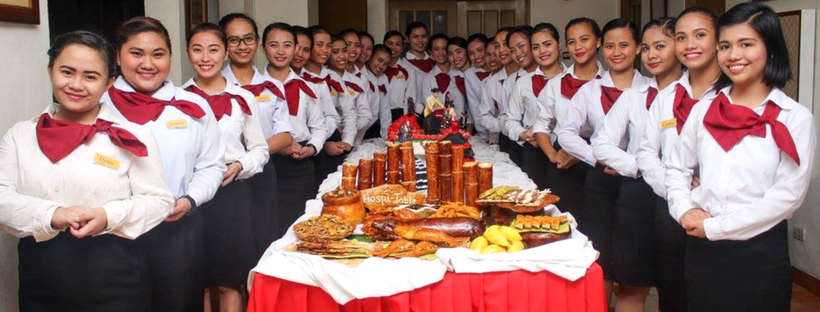
Brief History
The pre-history of the foundation dates back to the 1970’s when a handful of women took initiatives to teach domestic skills to young girls from provinces who are seeking greener pastures in the city.
In 1975, Punlaan (Tagalog word for seedbed), located at 173 M. Paterno, San Juan, Manila became its first venue for formal training. Within a few years, another training center in Malate opened which is now known as Manila Institute for Culinary Arts and Residential Services (MICARS).
By 1982, the Foundation for Professional Training, Inc. (FPTI) was organized and registered with the Securities and Exchange Commission and the Bureau of Internal Revenue as a donee institution.
During this decade, FPTI expansion included the establishment of Anihan Technical School in Calamba, Laguna (around 52 km south of Manila) in 1986, and Banilad Center for Professional Development in Cebu (Central Visayas) in 1989.
At the onset of the 90’s, Habihan School was inaugurated to reach out to communities in Quezon City. With more schools and more beneficiaries, the 1990’s saw FPTI gearing for growth in service through development of its programs.
In 1993, Punlaan pioneered and launched the European-based technical-vocational Dual Training Scholarship Program in food and beverage services under the auspices of Landesinstitut fur Internationale Berufsbilding. Highly-endorsed and approved by then First Lady, Mrs. Amelita Ramos, the program’s successful implementation paved the way for the enactment of the Dual Training law of the Philippines.
In 1995, MICARS found its new home in a six-story building with state-of-the-art kitchen facilities that adequately support its work-study program.
In the new millennium, livelihood generating activities and more innovations were introduced in the schools. Anihan Technical School served as prototype of this scheme for financial sustainability for its educational programs.
In 2001, FPTI passed the accreditation as donee institution by the Philippine Council for NGO Certification (PCNC) and received the seal of good housekeeping.
The 2-year program offered by the FPTI Schools has consistently provided 100% employment to its graduates in the hotel and restaurant industry and garnered an accolade of awards for the training centers and its alumni.
With more than 20 years of commitment to service and development, FPTI continues to meet the challenges of its various stakeholders — women from all walks of life, especially those with lesser means, volunteers, service sector partners, donors, and friends — through constant nurturing of its core educational values and updating of strategies for honing its competencies.

Best Practices
100% Employment of Graduates
Known for their competencies and work ethics, graduates of FPTI Schools are immediately employed by local and international business establishments offering hotel and restaurant services, but also by institutional lodging places in the National Capital Region and in provinces.
Innovative Technical-Vocational Education
Punlaan School’s adoption of the Dual Training System resulted to acquisition of quality skills by its graduates, enhancement of opportunities for their gainful employment, and improvement on the productivity of its partner companies. Moreover, it contributed to the breaking out of the lower income group and enabled its benefactors to form part of the middle class society. During the National Congress on Dual Training System in 1996, Punlaan received a plaque of recognition from TESDA for its pioneering efforts in the social and economic development of the country and its significant contribution to alleviation of poverty.
Self-Sustainability
As a component of Anihan’s 2-year program in food service, major in baking, the school’s innovation of a livelihood center has been proven strategic to achieving financial sustainability. This so-called “earn-while-you learn” scheme, enable students to raise funds for their daily living allowance while under training.
The in-school plan of training is an excellent model for attaining self-sustainability in the context of dwindling sources of traditional donations. Anihan’s Livelihood Center contributes 20-35% to the monthly financial revenues needed for school operations. During her visit, Gov. Teresita Lazaro commended, “we have livelihood projects in every town and barangay in Laguna, but none as beautiful as Anihan.”
Likewise, the Ambassador of Switzerland shared her appreciation of the school and emphasized the former President Corazon C. Aquino’s admiration of Anihan in providing opportunities for advancement of women living in the agro-industrial margins of CALABARZON.
Anihan’s new facilities for livelihood training is a grant from the Belgian government through a 3-year development cooperation with the Association for Cultural, Technical Educational Cooperation (ACTEC).
Ramon Magsaysay Awardees
The Ramon Magsaysay Award Foundation in cooperation with the Technical Education and Skills Development Authority (TESDA) granted the prestigious international workers award to FPTI school graduates from Punlaan and Habihan in separate years.
Mae Agnes Rusia, employed at the Peninsula Manila as “commis”, won in 1998 the Ramon Magsaysay Most Outstanding Worker Award (Rank and File Category) in the National Capital Region of Manila. The following year, Marichu Pedriña, working at the Café Barcelona located in Ortigas Center, bagged a similar award for the Wage Employment Category.





